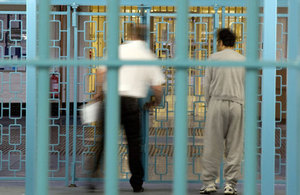Crackdown on violence in prisons
A major step forward in the fight against violence in prisons has been announced by the Ministry of Justice (MOJ).

Prison
The new joint protocol produced by the Prison Service, Crown Prosecution Service (CPS) and Association of Chief Police Officers (ACPO) will set out that when there are serious assaults on prison staff, the perpetrators will be prosecuted unless there is a good reason why not.
The protocol will also provide robust guidelines for joint working between prisons, police and CPS to ensure that wherever possible prisoners who commit serious assaults on staff or other serious crimes – such as hostage taking, arson, absconds – are punished through the courts. It will help to improve crime reporting and information sharing and most importantly it will improve the service to victims of crime in prisons, especially hard-working prisons staff. It will be fully implemented in prisons in England and Wales before the end of the financial year.
It is already the case that there is a presumption that sentences for offences committed in prison will be served at the end of, rather than alongside, the initial prison sentence. The protocol will help reinforce this.
This new approach sits within the Prison Service’s wider violence reduction strategy, focused on reducing violent behaviour and making the most of the latest technology such as body worn cameras. Work is already underway in London aimed at tackling gang related crime in London prisons.
The MOJ has also put forward new legislation in the Serious Crime Bill now going through Parliament to ensure that prisoners who possess knives and other offensive weapons in prison will face prosecution under a new criminal offence punishable by up to four years in prison. This will further strengthen the measures available to tackle the most serious violence in our prisons.
Prisons Minister Andrew Selous said:
I am delighted that this new approach to investigating crime in prisons will ensure that those that attack staff are prosecuted and fully brought to justice. It will mean that more of the prisoners who assault staff will spend longer behind bars.
Violence in prisons is not tolerated and assaults on our hardworking staff are unacceptable. I do not underestimate the hard work and challenges that prison staff face on a daily basis which is why we have been working extremely closely with the police and CPS to tackle this issue.
We have always had a complex and challenging prison population but are taking appropriate steps to ensure that we carefully manage the increased levels of violence.
Attorney General Jeremy Wright said:
This protocol will make it clear that prosecution should usually follow when prisoners assault hard-working prison staff. Prison officers deserve the greatest clarity and the best protection we can give them.
These new guidelines will provide additional guidance to prosecutors, who review all charging decisions in accordance with the Code for Crown Prosecutors. It will ensure that different police force and CPS areas pursue prosecutions of crimes within prison in a consistent and efficient way. While it is right that there should be some local prioritisation of crime investigation and prosecution, all agencies want to ensure that serious crimes in prison are dealt with fully by the criminal justice system.
Notes to editors
-
There were 3,427 assaults on staff in the 12 months to June 2014, 25% were referred to the police, but the majority were dealt with by adjudication.
-
This is a joint protocol between NOMS, the CPS and ACPO. It sets out the responsibilities of each of the three organisations when crimes are committed within prison.
-
The protocol clearly sets out the aggravating factors that would lead to a referral from NOMS to the police. The first of these crimes covered in an associated document, is “assaults on staff” - a priority for all parties. The main points of the protocol are:
- clear guidance to all parties on those crimes that must be considered for prosecution
- commitment to joint working at local and national level and the establishment of a national inter-agency forum to monitor the implementation of the protocol and issues arising from it
- the mandating of the production of “Prison Community Impact Statements” in many circumstances which can be used by the CPS at court to explain the seriousness of the crime and its impact on the unique prison environment, particularly where the crime threatens control and order in prison
- greater awareness of the rights and roles of the victim in prosecutions and the greater use of victim personal statements to allow the victim to explain the impact the crime has had on them
- prosecutors to ensure that courts are reminded of the sentencing guidelines specific to serving prisoners which recommend a sentence consecutive to an existing offence particularly for violent crimes
- a route for appeal against decisions not to prosecute if issues cannot be resolved through local discussion
-
The Code for Crown Prosecutors requires the CPS to consider whether there is sufficient evidence and, if so, whether a prosecution is in the public interest before charging.
-
For more information contact the MoJ Press Office newsdesk on 020 3334 3536 and follow us @MoJPress on Twitter.